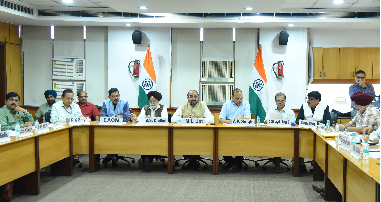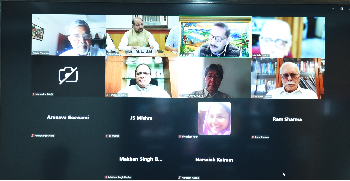15 September 2025, New Delhi
The National Academy of Agricultural Sciences (NAAS), in collaboration with the Indian Council of Agricultural Research (ICAR), organized a high-level brainstorming session on "Innovative Approaches for Sustainable Crop Residue Management" today.

The event was held in hybrid mode and witnessed active participation from policymakers, agricultural scientists, industry stakeholders, and farmer representatives. The session was co-chaired by Dr. Himanshu Pathak, President, NAAS, and Dr. M. L. Jat, Secretary (DARE) and Director General (ICAR).
Dr. Rajbir Singh, Deputy Director General (Agricultural Extension), ICAR, served as the Convener, while Dr. H.S. Sidhu, Former Head, FMPE, Punjab Agricultural University (PAU), Ludhiana, was the Co-Convener.
The session commenced with welcome remarks followed by an overview of the current status and achievements in crop residue management. Distinguished speakers, including senior officials from ICAR and the Department of Agriculture and Farmers Welfare (DA&FW), deliberated on key government initiatives, state perspectives, and challenges related to crop residue burning.

Panel discussions were conducted without formal presentations to encourage open dialogue, and focused on critical themes such as strengthening institutional mechanisms, advancing remote sensing technologies for residue monitoring, and promoting bio-decomposers for paddy straw management. Industry leaders shared insights on leveraging crop waste for bioenergy production, scaling up circular economy solutions in agriculture, and innovations in baling and collection systems.
Farmer representatives and private sector participants also contributed their practical experiences and highlighted the need for increased access to equipment, quality assurance, and capacity building at the grassroots level.
The session concluded with a set of actionable recommendations aimed at enhancing the effectiveness of crop residue management in India. Key suggestions included the identification of stubble-burning hotspots with robust localized action plans, optimal utilization and rational deployment of available machinery, and incentivizing Gram Panchayats demonstrating excellence in residue management. It was recommended to develop mechanisms for monetizing ecosystem services and linking them to carbon markets, while intensifying Information, Education and Communication (IEC) campaigns in high-risk zones to discourage residue burning.
A strong emphasis was placed on motivating Custom Hiring Centres (CHCs) to support small and marginal farmers through affordable equipment rentals, and on adopting a multi-criteria analysis approach to identify region-specific solutions. The need to assess CHC operations and create viable business models for their sustainability was also highlighted.
Further, the session stressed the importance of generating accurate nationwide estimates of biomass production, establishing a comprehensive database of residue-related issues and solutions, and promoting a balanced mix of in-situ and ex-situ management techniques along with crop diversification. Participants called for the preparation of a status paper on the Crop Residue Management Scheme to enable mid-term corrections, ensuring quality standards for subsidized machinery, and creating enabling policy ecosystems to facilitate value addition of crop residues.
The event concluded with consensus on the importance of collaborative, innovation-driven, and regionally adaptive strategies to address the multifaceted challenges of crop residue management and to promote sustainable agricultural practices across the country.
(Source: Agricultural Extension Division, ICAR)








Like on Facebook
Subscribe on Youtube
Follow on X X
Like on instagram